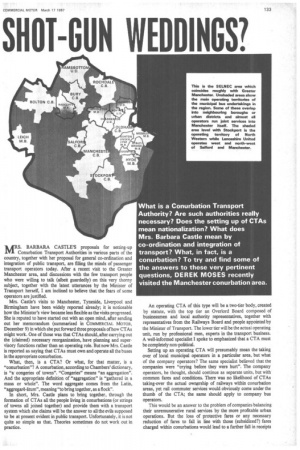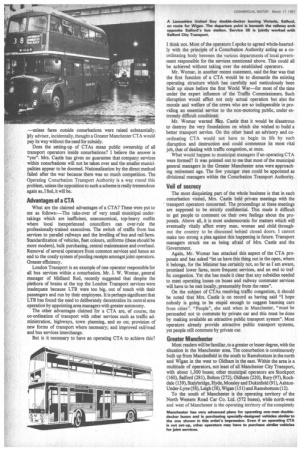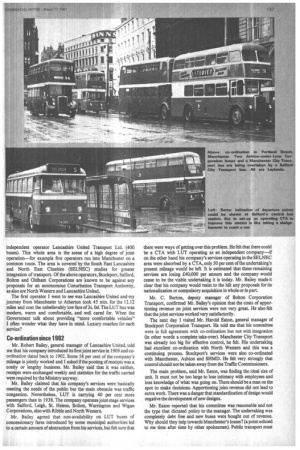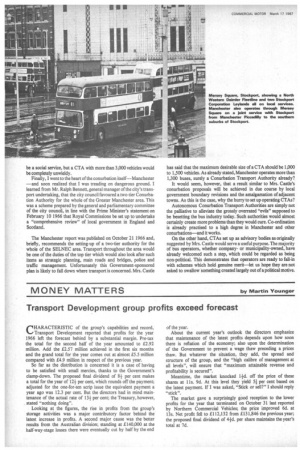SHOT-GUN WEDDINGS?
Page 143

Page 144

Page 147

Page 148

If you've noticed an error in this article please click here to report it so we can fix it.
MRS. BARBARA CASTLE'S proposals for setting-up Conurbation Transport Authorities in various parts of the country, together with her proposal for general co-ordination and integration of public transport, are filling the minds of passenger transport operators today. After a recent visit to the Greater Manchester area, and discussions with the few transport people who were willing to talk (albeit guardedly) on this very thorny subject, together with the latest utterances by the Minister of Transport herself, I am inclined to believe that the fears of some operators are justified.
Mrs. Castle's visits to Manchester, Tyneside, Liverpool and Birmingham have been widely reported already; it is noticeable how the Minister's view became less flexible as the visits progressed. She is reputed to have started out with an open mind, after sending out her memorandum (summarized in COMMERCIAL MOTOR, December 9) in which she put forward three proposals of how CTAs might work. One of those was that CTAs should, after carrying out the (claimed) necessary reorganization, have planning and supervisory functions rather than an operating role. But now Mrs. Castle is reported as saying that CTAs must own and operate all the buses in the appropriate conurbation.
What, then, is a CTA? Or what, for that matter, is a "conurbation"? A conurbation, according to Chambers' dictionary, is "a congeries of towns". "Congeries" means "an aggregation". And the appropriate definition of "aggregation" is "gathered in a mass or whole". The word aggregate comes from the Latin, "aggregare-hum", meaning "to bring together, as a flock".
In short, Mrs. Castle plans to bring together, through the formation of CTAs all the people living in conurbations (or strings of towns all joined together) and provide them with a transport system which she claims will be the answer to all the evils supposed to be at present evident in public transport. Unfortunately, it is not quite so simple as that. Theories sometimes do not work out in practice. An operating CTA of this type will be a two-tier body, created by statute, with the top tier an Overlord Board composed of businessmen and local authority representatives, together with representatives from the Railways Board and people appointed by the Minister of Transport. The lower tier will be the actual operating unit, run by professional men, experts in the transport business. A well-informed specialist I spoke to emphasized that a CTA must be completely non-political.
Setting up an operating CTA will presumably mean the taking over of local municipal operators in a particular area, but what of the company operators? The same specialist believed that the companies were "crying before they were hurt". The company operators, he thought, should continue as separate units, but with common fares and conditions. There was no likelihood of CTAs taking-over the actual ownership of railways within conurbation areas, yet rail commuter services would obviously come under the thumb of the CTA; the same should apply to company bus operators.
This would be an answer to the problem of companies balancing their unremunerative rural services by the more profitable urban operations. But the loss of protective fares or any necessary reduction of fares to fall in line with those (subsidized?) fares charged within conurbations would lead to a further fall in receipts —unless fares outside conurbations were raised substantially. taily adviser, incidentally, thought a Greater Manchester CTA would pay its way without the need for subsidy.
Does the setting-up of CTAs mean public ownership of all transport operators inside conurbations? I believe the answer is "yes". Mrs. Castle has given no guarantee that company services within conurbations will not be taken over and the smaller municipalities appear to be doomed. Nationalization by the direct method failed after the war because there was so much competition. The Operating Conurbation Transport Authority is a way round this problem, unless the opposition to such a scheme is really tremendous again as, I feel, it will be.
Advantages of a CTA
What are the claimed advantages of a CTA? These were put to me as follows:—The take-over of very small municipal undertakings which are inefficient, uneconomical, top-heavy outfits where local inexperienced councillors can over-rule the professionally-trained executives. The switch of traffic from bus services to parallel railways and the levelling of bus and rail fares. Standardization of vehicles, fleet colours, uniforms (these should be more modern), bulk purchasing, central maintenance and overhaul. Removal of several operators from common services and hence an end to the costly system of pooling receipts amongst joint operators. Greater efficiency.
London Transport is an example of one operator responsible for all bus services within a conurbation. Mr. J. W. Womar, general manager of Midland Red, recently suggested that despite the plethora of brains at the top the London Transport services were inadequate because LTB were too big, out of touch with their passengers and run by their employees. It is perhaps significant that LTB has found the need to deliberately decentralize its central area operation by appointing area managers with greater autonomy.
The other advantages claimed for a CTA are, of course, the co-ordination of transport with other services such as traffic administration, highways, town planning, and so on; provision of new forms of transport where necessary; and improved rail/road and bus services interchange.
But is it necessary to have an operating CTA to achieve this? I think not. Most of the operators I spoke to agreed whole-heartedly with the principle of a Conurbation Authority acting as a coordinating body between the various departments of local government responsible for the services mentioned above. This could all be achieved without taking over the established operators.
Mr. Womar, in another recent statement, said the fear was that the first function of a CTA would be to dismantle the existing operating structure which has carefully and meticulously been built up since before the first World War—for most of the time under the expert influence of the Traffic Commissioners. Such disruption would affect not only actual operation but also the morale and welfare of the crews who are so indispensible in providing an essential service to the non-motoring public, under extremely difficult conditions: Mr. Womar warned Ws. Castle that it would be disastrous to destroy the very foundations on which she wished to build a better transport service. On the other hand an advisory and coordinating CTA would not have to begin its life by such disruption and destruction and could commence its most vital job, that of dealing with traffic congestion, at once.
What would happen to municipal managers if an operating CTA were formed? It was pointed out to me that most of the municipal general managers in the Greater Manchester area were approaching retirement age. The few younger men could be appointed as divisional managers within the Conurbation Transport Authority.
Veil of secrecy
The most disquieting part of the whole business is that in each conurbation visited, Mrs. Castle held private meetings with the transport operators concerned. The proceedings at these meetings are supposed to be strictly confidential. This made it difficult to get people to comment on their own feelings about the proposals. Above all, it is most undemocratic for matters which will eventually vitally affect every man, woman and child throughout the country to be discussed behind closed doors. I cannot make too strong a plea against this happening in future. Transport managers struck me as being afraid of Mrs. Castle and the Government.
Again, Mr. Womar has attacked this aspect of the CTA proposals and has asked "let us have this thing out in the open, where it belongs, for the Minister has certainly not, so far as I am aware, promised lower fares, more frequent services, and an end to traffic congestion. Yet she has made it clear that any subsidies needed to meet operating losses on buses and railway commuter services will have to be met locally, presumably from the rates".
On the subject of CTAs resolving traffic congestion, it should be noted that Mrs. Castle is on record as having said "I hope nobody is going to be stupid enough to suggest banning cars from cities". "People", she said when in Manchester, "must be persuaded not to commute by private car and this must be done by making available an attractive public transport system". Most operators already provide attractive public transport systems, yet people still commute by private car.
Greater Manchester
Most readers will be familiar, to a greater or lesser degree, with the situation in the Manchester area. The conurbation is continuously built up from Macclesfield in the south to Ramsbottorn in the north and Wigan in the west to Oldham in the east. Within the area is a multitude of operators, not least of all Manchester City Transport, with about 1,300 buses; other municipal operators are Stockport (160), Salford (281), Bolton (272), Oldham (220), Bury (97), Rochdale (139), Stalybridge, Hyde, Mossley and Dukinfield (91), AshtonUnder-Lyne (58), Leigh (58), Wigan (151) and Ramsbottom (12).
To the south of Manchester is the operating territory of the North Western Road Car Co. Ltd. (572 buses), while north-west and west of Manchester is the operating territory of the completely
independent operator Lancashire United Transport Ltd. (400 buses). This whole area is the scene of a high degree of joint operation—for example five operators run into Manchester on a common route. The area is covered by the South East Lancashire and North East Cheshire (SELNEC) studies for greater integration of transport. Of the above operators, Stockport, Salford, Bolton and Oldham Corporations are known to be against any proposals for an autonomous Conurbation Transport Authority, as also are North Western and Lancashire United.
The first operator I went to see was Lancashire United and my journey from Manchester to Atherton took 45 min. for the 12.12 miles and cost the unbelievably low fare of 2s. Od. The LUT bus was modern, warm and comfortable, and well cared for. When the Government talk about providing "more comfortable vehicles" I often wonder what they have in mind. Luxury coaches for each service?
Co-ordination since 1902
Mr. Robert Bailey, general manager of Lancashire United, told me that his company introduced its first joint service in 1909 and coordination dated back to 1902. Some 58 per cent of the company's mileage is jointly worked and I asked if the pooling of receipts was a costly or lengthy business. Mr. Bailey said that it was neither, receipts were exchanged weekly and statistics for the traffic carried were required by the Ministry anyway.
Mr. Bailey claimed that his company's services were basically meeting the needs of the public but the main obstacle was traffic congestion. Nevertheless, LUT is carrying 40 per cent more passengers than in 1938. The company operates joint stage services with Salford, Leigh, St. Helens, Bolton, Warrington and Wigan Corporations, also with Ribble and North Western.
Mr. Bailey agreed that non-availability on LUT buses of concessionary fares introduced by some municipal authorities led to a certain amount of abstraction from his services, but felt sure that there were ways of getting over this problem. He felt that there could be a CTA with LUT operating as an independent company—if on the other hand his company's services operating in the SELNEC area were absorbed by a CTA, only 30 per cent of the undertaking's present mileage would be left. It is estimated that these remaining services are losing £40,000 per annum and the company would cease to be the viable undertaking it is today. Mr. Bailey made it clear that his company would resist to the hilt any proposals for its nationalization or compulsory acquisition in whole or in part.
Mr. C. Burton, deputy manager of Bolton Corporation Transport, confirmed Mr. Bailey's opinion that the costs of apportioning revenue on joint services were not very great. He also felt that the joint services worked very satisfactorily.
The next day I visited Mr. Harold Eaton, general manager of Stockport Corporation Transport. He told me that his committee were in full agreement with co-ordination but not with integration (in other words a complete take-over). Manchester City Transport was already too big for effective control, he felt. His undertaking had excellent co-ordination with North Western and this was a continuing process. Stockport's services were also co-ordinated with Manchester, Ashton and SHMD. He felt very strongly that control should not be taken away from the Traffic Commissioners.
The main problem, said Mr. Eaton, was finding the ideal size of unit. It must not be too large to lose intimacy with employees and lose knowledge of what was going on. There should be a man on the spot to make decisions. Apportioning joint revenue did not lead to extra work. There was a danger that standardization of design would negative the development of new designs.
Mr. Eaton reported that his committee was reasonable and not the type that dictated policy to the manager. The undertaking was completely debt free and new buses were bought out of revenue. Why should they help towards Manchester's losses? (a point echoed to me time after time by other spokesmen). Public transport must be a social service, but a CTA with more than 3,000 vehicles would be completely unwieldy.
Finally, I went to the heart of the conurbation itself—Manchester —and soon realized that I was treading on dangerous ground. I learned from Mr. Ralph Bennett, general manager of the city's transport undertaking, that the city council favoured a two-tier Conurbation Authority for the whole of the Greater Manchester area. This was a scheme prepared by the general and parliamentary committee of the city council, in line with the Prime Minister's statement on February 10 1966 that Royal Commissions be set up to undertake a "comprehensive review" of local government in England and Scotland.
The Manchester report was published on October 21 1966 and, briefly, recommends the setting-up of a two-tier authority for the whole of the SELNEC area. Transport throughout the area would be one of the duties of the top tier which would also look after such items as strategic planning, main roads and bridges, police and traffic management. Unfortunately this Government-sponsored plan is likely to fall down where transport is concerned. Mrs. Castle has said that the maximum desirable size of a CTA should be 1,000 to 1,500 vehicles. As already stated, Manchester operates more than 1,300 buses, surely a Conurbation Transport Authority already?
It would seem, however, that a result similar to Mrs. Castle's conurbation proposals will be achieved in due course by local government boundary revisions and the amalgamation of adjacent towns. As this is the case, why the hurry to set up operating CTAs?
Autonomous Conurbation Transport Authorities are simply not the palliative to alleviate the grossly overrated "evils" supposed to be besetting the bus industry today. Such authorities would almost certainly create more problems than they would cure. Co-ordination is already practised to a high degree in Manchester and other conurbations—and it works.
On the other hand. CTAs set up as advisory bodies as originally suggested by Mrs. Castle would serve a useful purpose. The majority of bus operators, whether companyor municipality-owned, have already welcomed such a step, which could be regarded as being non-political. This demonstrates that operators are ready to fall-in with schemes which hold genuine merit—let us hope they are not asked to swallow something created largely out of a political motive,








































































































































































































